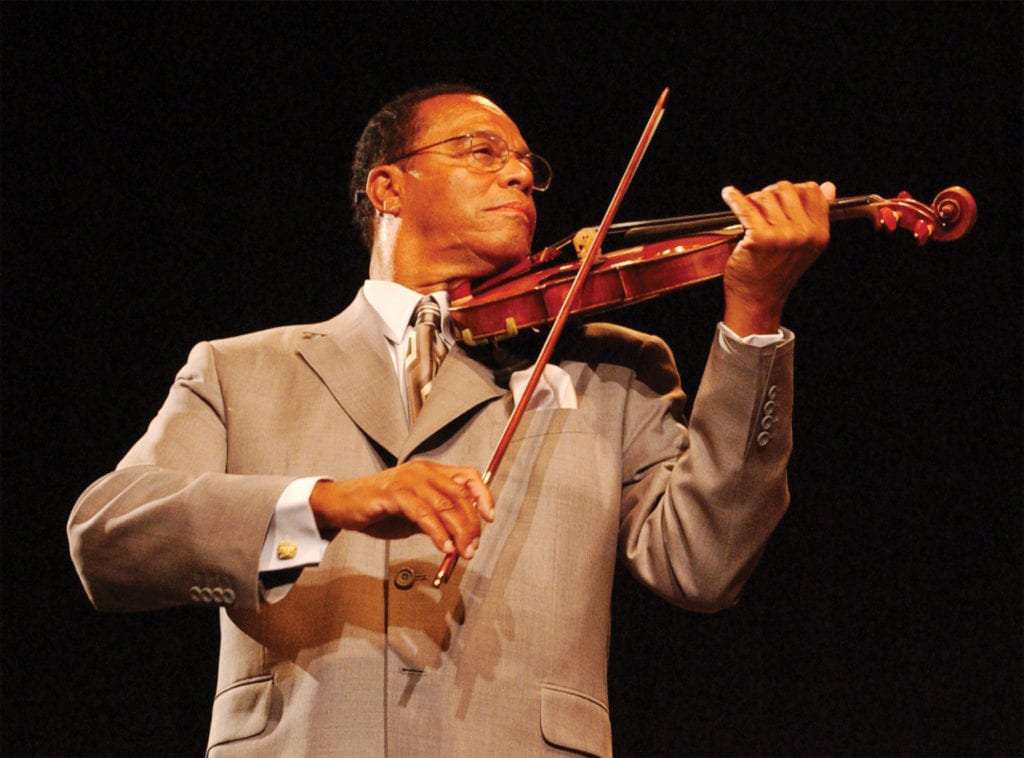
Music plays a major role in people’s lives, but rarely do we consider the power of music. Back in the 18th century, the British poet and dramatist William Congreve expressed that power with the memorable quote: “Music has charms to soothe the savage breast, to soften rocks, or bend a knotted oak.” Now Louis Farrakhan offers a solemn entreaty to use that power to save the world, and he has provided a unique gift of music to assist in that process.
Farrakhan’s “Let’s Save the World” album contains a number of recordings that he has produced and have now been compiled as a gift of love to all humanity. His understanding of the power of music is that “the science of music … is at the root of the true religion of God.” So now, after his 60-year mission to resurrect the black man and woman from their long travails in America, Farrakhan has presented a seven-disc collection of music to help lift all human beings to a higher spiritual level.
The first piece, “Salut d’Amour” (Greetings of Love) by Edward Elgar, recorded in 2013, establishes his musical intention. Then his performance of J.S. Bach’s “Double Violin Concerto” with Ayke Agos clearly assures the listener of his competence to perform technically at the highest level. His production of the Londonderry Air, an Irish folk song, then establishes the universality of Farrakhan’s call to save the world.
The quality of the album will satisfy the most critical audience that Farrakhan, who produced most of the numbers and began his musical education as a youth in Boston, has attained the status of a violin virtuoso. His idol was the incomparable Jascha Heifetz, whose closest associate and companion, the master violinist Ayke Agos, collaborated with Farrakhan on much of the music. The services of musicians from the Chicago Symphony Orchestra and other equivalent musical groups were obtained.
The selection of the music chosen for the album indicates Farrakhan’s sensitivity to the various states of human emotions. The Bach double concerto portrays the human capacity for majesty and authority, while “Vocalise” by Sergei Rachmaninoff, which the composer wrote as an expression of his sadness over a lost love, creates a sense of empathy. Jules Massenet’s “Méditation” from his opera Thais, inspires reflection, as the title implies.
Jazz artists have often claimed, with musical sophistication, that Johann Sebastian Bach must have been an early proponent of jazz. Farrakhan must agree. He included two more pieces by Bach in the album: “Air in G” and “Arioso.”
Over the years, a number of great black musicians have joined with Farrakhan in his effort to provide music for the people. Included are the late Charles Veal, a former violin soloist for the Los Angeles Philharmonic; Stephanie Mills; the late Sylvia Olden Lee, the first black voice coach for the Metropolitan Opera; and Chaka Khan, who performed Gershwin on the album (“Summertime” and “Ain’t Necessarily So”). Karen Briggs, a highly regarded jazz violinist, played “Green Dolphin Street.”
The grace of Farrakhan’s gift of music was inspired by his Muslim faith and the many years he spent in an effort to counter the negative propaganda that was misleading black people in America. Disc six contains copies of the music he produced in the 1980s in his relentless campaign to achieve black unity. Those songs helped to create support for the cause that made the Million Man March a success.
Disc seven contains several songs that are dedicated to those who have suffered in the sinful world. In one, “Kol Nidrei,” Farrakhan wants to acknowledge the soul’s quest for divine mercy and forgiveness. With “Kol Nidrei” he expresses empathy for the struggle of the Jewish people.
Farrakhan is indeed well aware of the similarity between the oppression suffered by Jews as well as by blacks. He wants us to change the world, a goal that can happen only with enthusiastic commitment of people from all religions.
Farrakhan asserts that blacks’ “artistic and cultural advancement came on the heels of our pain and suffering. Were it not for our suffering there would be no gospels, no spirituals, no blues and no jazz. So [black] cultural development is true spiritual liberation that will cause a change in us and we will cause change in the world.”
To order the Let’s Change the World box set, visit https://www.letschangetheworldmusic.com/ or phone (800) 557-0676.






